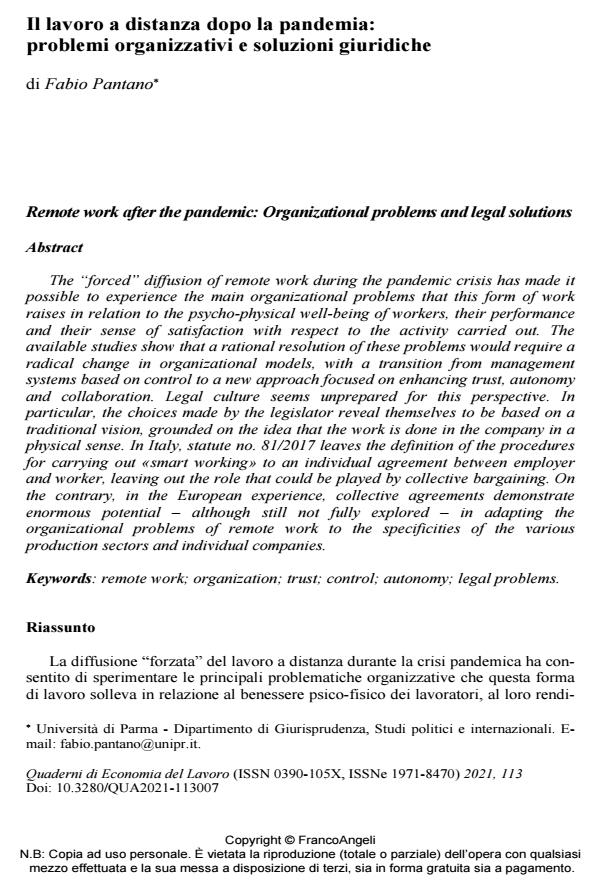Remote work after the pandemic: Organizational problems and legal solutions
Journal title QUADERNI DI ECONOMIA DEL LAVORO
Author/s Fabio Pantano
Publishing Year 2022 Issue 2021/113
Language Italian Pages 16 P. 167-182 File size 264 KB
DOI 10.3280/QUA2021-113008
DOI is like a bar code for intellectual property: to have more infomation
click here
Below, you can see the article first page
If you want to buy this article in PDF format, you can do it, following the instructions to buy download credits

FrancoAngeli is member of Publishers International Linking Association, Inc (PILA), a not-for-profit association which run the CrossRef service enabling links to and from online scholarly content.
The "forced" diffusion of remote work during the pandemic crisis has made it possible to experience the main organizational problems that this form of work raises in relation to the psycho-physical well-being of workers, their performance and their sense of satisfaction with respect to the activity carried out. The available studies show that a rational resolution of these problems would require a radical change in organizational models, with a transition from management systems based on control to a new approach focused on enhancing trust, autonomy and collaboration. Legal culture seems unprepared for this perspective. In particular, the choices made by the legislator reveal themselves to be based on a traditional vision, grounded on the idea that the work is done in the company in a physical sense. In Italy, statute no. 81/2017 leaves the definition of the procedures for carrying out «smart working» to an individual agreement between employer and worker, leaving out the role that could be played by collective bargaining. On the contrary, in the European experience, collective agreements demonstrate enormous potential - although still not fully explored - in adapting the organizational problems of remote work to the specificities of the various production sectors and individual companies.
Keywords: remote work; organization; trust; control; autonomy; legal problems.
- Innovazione tecnologica e lavoro agile: quadro evolutivo, dimensioni di sostenibilità e profili organizzativi Azio Barani, in QUADERNI DI ECONOMIA DEL LAVORO 114/2023 pp.187
DOI: 10.3280/QUA2021-114007
Fabio Pantano, Il lavoro a distanza dopo la pandemia: problemi organizzativi e soluzioni giuridiche in "QUADERNI DI ECONOMIA DEL LAVORO" 113/2021, pp 167-182, DOI: 10.3280/QUA2021-113008